#biiiig portions im telling you
Explore tagged Tumblr posts
Note
13 and 18 ❤️❤️❤️
here she is🤩
13) this year's birthday: it was nothing much, it was a workday, tuesday specifically (LAME), i was tired from work, so i just talked with my ex, then a dear family friend showed up unexpectedly which was nice, they brought me the (classic for me) oreo cake and that was it:)
18) a memorable meal: (of course you'd ask this and i love it) my friends and I had incredible sea food at Φούρνοι Ικαρίας, like everything was fresh, godly delicious AND on the cheap side!
#we had lobster pasta!!! 🍝🥴#plus some other smaller fish#biiiig portions im telling you#irt the birthday: as the years pass i find myself less and less moved by this day. i don't know maybe it's cause im in a transitional phase#but yes this year i didn't really care about becoming 24. there was other stuff going on#asx
4 notes
·
View notes
Note
Hi please PLEASE talk to me abt the socioeconomic state of japan in bnh verse I am SO interested to hear ur thoughts? I'm a poli theory major and let me tell u im a SLUT for fic that deal w the political/social repercussions of fictional happenings
sure thing!
disclaimer: i only just graduated high school so i’m pulling all of this out of my ass one semester of macroeconomics i took in senior year. feel free to add onto or correct any of this
edit: if anyone wants to use this for reference when writing boku no hero japan, feel free! i’d appreciate any credit, but it’s not necessary.
--
what really got me thinking about the socioeconomic state of boku no hero japan was probably the difference between orudera junior high (bakugou and izuku’s school) vs. yuuei, both of which are in the same city, musutafu. orudera junior high gives off the feeling of a school that’s a bit run down; not terrible enough that it obstructs the kids’ education, but enough that you think the school probably can’t afford to keep it in good repair.
here’s a screenshot of bakugou and izuku’s classroom:

and then here’s izuku’s desk, which has details indicating that it’s in slight disrepair:

if you go back through the chapters and look at the setting at yuuei, it’s spic-n-span. just super clean and well-kept. it’s an entire world of difference… so already there is this huge disparity between the junior high school in izuku’s neighborhood, and yuuei, which is a 40 minute subway ride away (chapter 3).
makes sense that yuuei would be so nice and expensive if it’s the most prestigious hero academy in the country, right? but there’s more details too, like this brief exchange between bakugou & iida right at the very beginning:

bakugou’s resentful comment about iida being an “elite” really only makes sense to me in the context of economic disparity. let’s infer that soumei junior high is better funded, better equipped, better everything in general. of course bakugou will resent iida for that, especially coming from the more ill-maintained orudera junior high. the difference in their economic status is already apparent.
this isn’t even going into the difference between yaoyorozu’s incredibly rich status vs the rest of the class vs uraraka, who has decided to become a hero because she wants the financial security, and who also lives in an apartment by herself and skips meals to save on money. so even within the class itself there’s a huuuge difference in economic status.
you could just think of it as the individual circumstances of the characters, but i think it’s more of a systematic problem – see, again, the difference in infrastructure quality between the different schools (the public school is not doing so great but yuuei is doing fantastic). maybe the city is poor, or maybe all of its funds go towards repairing the constant property damage from villain attacks, or maybe there’s just some areas they don’t care to maintain. either way: just by traversing different parts of the city you’ll probably see big differences in how well the neighborhoods are kept.
and now, for a different question: if this is the golden age of peace, why are there still so many villain fights?
looking at chapter one (the first villain we see is a guy who stole a purse and then tried to fight back when he was caught) and chapter 115 (villain activity increases sharply after all might’s retirement), i feel like… these attacks are driven by financial need. look at this:
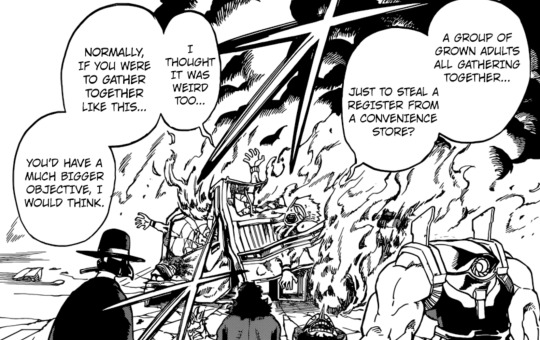
a group of adults gathered to commit crime… just to steal a register from a convenience store. that’s such a small sum of money! but they were so elated to get just that amount. it seems like the kind of thing that would happen if you were strapped for money, right?
and then the villain from chapter 1: why would he fight so hard just because he got caught stealing a purse? he stopped the trains, for pete’s sake. all i can think is that a) he needed the money he’d be able to get by selling the purse, or b) he knew he wouldn’t be able to afford the fines, and that’s why he fought.
maybe i’m reading too much into this, but based off these crimes, plus the other details provided above, i really feel like there’s a growing problem in boku no hero japan where there’s an increasing disparity in wealth.
another thing to consider: in the golden age of peace, you’d have to be pretty stupid, pretty reckless, or pretty desperate to commit a crime where heroes frequent. (or you’re a black market dealer and/or evil.) if you’ve got an increasing number of people who are poor, who are dropping from the middle class to under the poverty line, or who have no upwards economic mobility, then you’ve got plenty of people desperate enough to try some petty crime for the sake of just a bit more cash for rent this month. that would be enough to explain the frequent villain fights that heroes get into – which are common enough that people will stop by and watch the show on their way to work. (chapter 1)
this is really just a theory… but what could you use to explain why there’s a growing number of people struggling to make ends meet?
here’s some factoids about japan (this article is from 2016):
its real wages were falling, and as such, had weak domestic consumption; people buying less & saving more, or people just not having the money to spend in the first place, resulting in less money circulating in the economy and causing the economy to slow down. efforts to stimulate wage growth in 2015 did not make it down to the workers
there was an increasing number of people with non-regular jobs, part time jobs, etc. as opposed to full time jobs, so they couldn’t get the financial security of a full time job (source)
one in six people in 2014 were living in relative poverty. this rate is higher among single mothers and among middle aged men without families, i believe.
japan was like, 39th of 41 developed countries in terms of child poverty (the higher the number, the worse it is). something like that
this is despite japan having a high labor participation rate and a low unemployment rate, and also a low violent crime rate
basing boku no hero japan off of actual real world japan’s current economic problems: we could surmise that, in boku no hero japan, although nominal wages are rising, real wages are falling; infrastructure spending is poor and disorganized, geared towards repairing villain-inflicted property damage and not enough towards everything else; and people are finding difficulty holding onto jobs (as seen with uraraka’s parents) and are forced into low-paying, part-time work, and may find themselves struggling with debt.
oh, and here’s a quote from the guardian (jan 2017): “experts say programmes to help needy children are underfunded and held back by bureaucratic inefficiency and political apathy.”
so it’d actually be quite viable for boku no hero japan to be doing quite badly, economically, and to be struggling with wealth inequality and other super fun things like that.
boku no hero japan is also like centuries in the future, one where villainy is commonplace, so it’s not a surprise that people’s response to struggling to make ends meet would be “well, i have a pretty good quirk. if i’m lucky, i think i’ll be able to steal some cash, and i’m desperate enough to do it, too.” SO, my personal guess, is that this is a biiiig portion of the crimes that heroes fight.
i mean, it doesn’t really make sense for villains to do so much… villain-ing… when there’s footage almost every single week of the heroes taking down yet ANOTHER criminal. why do they keep coming out of the woodwork? why’s there still enough criminals to keep all the heroes in business? ‘cause they’re desperate and need the money, probably. which is understandable. so even if you eliminate a villain, you haven’t addressed the economic problems that drove them to become a villain in the first place; hence, there’s always someone else rising up to take their place.
on that note, let’s take a closer look at the hero industry!
in chapter 1, horikoshi gives us a brief history of heroics. quirks emerged, the government wasn’t sure what to do to combat quirk-related crime, heroes emerged, and heroes eventually became sanctioned by the law. and when that happened:

so that’s pretty cool! seems like heroes aren’t specifically a government institution, but they are affiliated with & rewarded by it. makes sense, since heroes have to work closely with law enforcement on some matters, anyways. heroes =/= police only because heroes are specifically there to combat quirk-related crime.
but times have changed since then, as shown in the latest manga chapter:
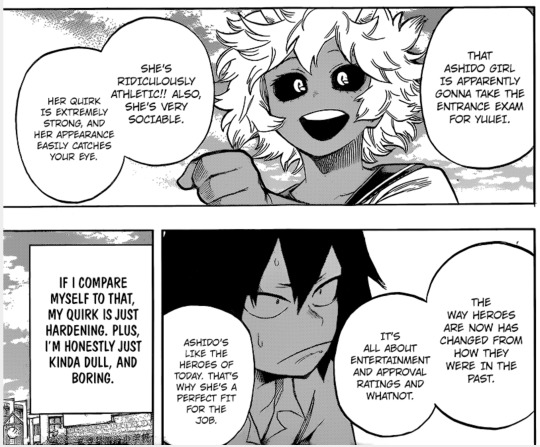
“it’s all about entertainment and approval ratings and whatnot.”
we know from the stain arc that heroes are still paid by the government:

‘given my status’ – in other words: his hero ranking? popularity? how respected he is as a hero? hmmm.
uraraka’s mentor that arc explains that heroes are sort of “paid on commission” by the number of crimes they can resolve, but said commissions usually get sent their way by the police:
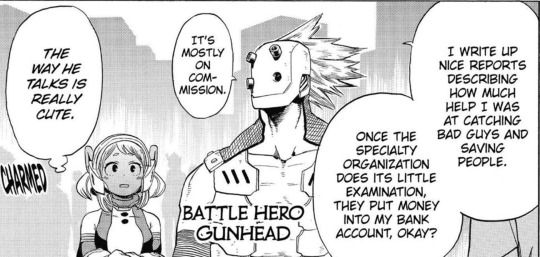
but to get your name out there (both to the police and to the public), and to become higher ranking in the popularity polls, you need to cultivate a public image, too. get yourself some attention.
so to cultivate a public image, one thing that heroes can do is to conduct a fight in a public, open space where anyone can see. apparently this happens often enough that izuku would actually regularly run into one of these fights on his way to/from school, and would stay to take notes and learn from them. villain attacks are ALSO frequent enough that apparently all might keeps arriving at yuuei late because he stops to help out:

in other words, villain attacks and fights are a regular, almost quotidian experience. more on that in a sec. for now, just think about how the heroes benefit from public fights: they get to show off, and their fights are broadcasted, and they can get a boost in their rankings. fighting against a villain, they don’t just have a motive to do their job and save people; they have a motive to grab the spotlight and show off. popularity boost! we actually see this happen in chapter one, when mount lady leaps into kamui woods’ fight and defeats a villain in one kick.
so, as a citizen, you may be grateful to the heroes for saving people – but you might resent them for turning these situations into a spectacle for showing off. incidents sometimes turn into competitions between heroes. if you take that a step further, you might think some of the heroes are only helping because they want to look good. and hey, that’s not the kind of person you’d want to entrust your life to, right?
because heroics is now partially driven by entertainment and image, heroes are all forming their separate hero agencies to try and differentiate themselves. for example, this list:

while they work together to fight crime, they have to battle for popularity and attention… they probably even have to vie for commissions/crime cases from the police. they all need to make themselves stronger, cooler, & a better choice than the other hero agencies. it’s something of a conflict of interest. you can imagine sometimes that gets in the way of cooperation (i.e. endeavor’s forever grudge against all might. y’all should read the illegals spin off.)
and if you’re battling for popularity and attention… it would also make sense for you to center your hero office somewhere with lots of crime, and lots of people to see you fighting crime. right? urban centers would provide plenty of both. what about slums, and the underground, and the outskirts, then? these are places that news reporters and cameras can’t reach easily – and possibly might not want to travel to at all. these are also places where passersby and onlookers might run away instead of praising you. you won’t get a lot of return (in terms of publicity) by working here. so if you’re business-minded… you’re not going to conduct your hero investigations here.
i mean, yuuei even has a business department. heroics is a business. you make money off of this, and you have to sell your image to the police and the public. if you focus more attention on places that are profitable to you, then the other areas lose. there’s no way around that.
so poor neighborhoods, bad neighborhoods, camera- and television broadcasting-inaccessible places get the short end of the stick. the heroes don’t go here as often, because it’s not profitable. (well, the heroes probably come down here if they get a police commission. but where are they if a spontaneous crime happens, hm?) meanwhile you turn on the t.v. and you see like five heroes show up at one battle downtown, which is complete overkill. you’d feel pretty resentful, right? do the heroes think your area of residence isn’t worth protecting, just because it doesn’t get them as much attention? do the heroes think it’s okay to just ignore your area of residence? fuck that, right? heroes are supposed to serve the public, and you’re still part of the public too, right?
that’s gonna build up more resentment between bad neighborhoods & areas v.s. the areas that heroes frequent (often urban, downtown, lots of people to witness their good deeds). and it definitely builds up resentment towards heroes who aren’t so discreet about the money-making aspects of their businesses.
like: all might sells merchandise. okay, understandable. present mic has a radio show (which probably gets paid to run advertisements). okay, that’s pretty cool! but then you get things like this:

a hero using their public service, publicly paid hours… to shoot a commercial and make themselves a little bit of cash on the side. if you’re in one of those areas that heroes don’t frequent so often – wouldn’t you be pretty furious to find out that the person who’s supposed to be fighting crime in your neighborhood just made $500,000 by filming a commercial instead?
you’re going to turn on the television and see ads with pro heroes in them – pro heroes who used their public service hours to do something for their own profit. this isn’t to say that heroes can’t film commercials, or make money on the side. if they’re helping people, it’s great that they can make a living! but they’re making that living by pandering to the entertainment industry when they’re supposed to be… you know… helping people. even kendou (in the picture above) comments that it’s not very hero like. the next page, momo replies that this aspect of the hero business is ‘unavoidable.’ ads, entertainment – it’s all part of the hero industry now.
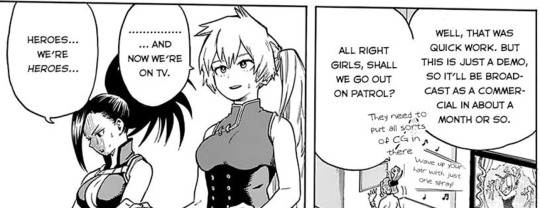
and they don’t feel that good about it.
if all this conjecture is true, then – as grateful as people are to the heroes – they might be quite critical of the hero industry itself, and the heroes that embody the worst parts of it. i’m not surprised that there are a whole bunch of people who feel “othered” by heroes, and by society as a whole.
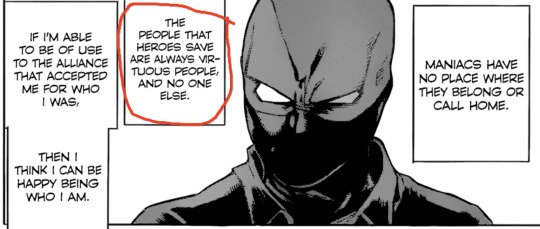
like… that’s no excuse to be a villain. stop that. but it would certainly be a reason for people to dislike the hero industry. AND it would explain why it is that stain’s ideology resonated so deeply with other people.
AAAAND that’s basically the rundown of what i think the socioeconomic state of boku no hero japan is like. sorry this was horribly long
#teasdays#readmore because this is unbearably long#meta#i guess?#i don't really have a proper tag for this stuff#ask
597 notes
·
View notes